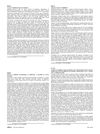11 citations,
October 2020 in “Sultan Qaboos University medical journal” Bariatric surgery helps with weight loss but can cause complications and nutritional deficiencies.
July 2011 in “Hair transplant forum international” No clear evidence links green tea to hair loss through iron deficiency.
 70 citations,
June 2010 in “Clinics in Dermatology”
70 citations,
June 2010 in “Clinics in Dermatology” Certain groups may need vitamin supplements to improve hair health and prevent other health problems.
 15 citations,
January 2010 in “Experimental Dermatology”
15 citations,
January 2010 in “Experimental Dermatology” Hair loss in certain young mice is linked to a specific gene and can be caused by lack of iron.
 March 2015 in “CRC Press eBooks”
March 2015 in “CRC Press eBooks” Telogen effluvium is a type of hair loss in women caused by many factors, and iron and thyroid tests are recommended for diagnosis.
 8 citations,
February 2007 in “Journal of The American Academy of Dermatology”
8 citations,
February 2007 in “Journal of The American Academy of Dermatology” Higher serum ferritin levels than currently used might be needed to rule out iron deficiency in women with hair loss.
 January 2015 in “Springer eBooks”
January 2015 in “Springer eBooks” Chronic kidney disease can cause hair loss, which may be related to zinc deficiency or certain medications, and sometimes hair grows back when the underlying issue is treated.
 November 2003 in “Journal of Investigative Dermatology”
November 2003 in “Journal of Investigative Dermatology” Topical Imiquimod may fight vascular tumors by affecting blood vessels or the immune system, low iron might be linked to some hair loss, removing the top skin layer helps vitamin C get in, genetic testing helps diagnose skin conditions, and too much iron could worsen skin inflammation.

Iron and zinc deficiencies may be treated to help female hair loss.
 83 citations,
May 1999 in “International Journal of Dermatology”
83 citations,
May 1999 in “International Journal of Dermatology” Hair loss that spreads out can often fix itself or be treated by finding and handling the cause.
December 2021 in “International Journal of Research in Dermatology” Female pattern hair loss in Saudi women is linked to low iron and vitamin D levels.
 April 2024 in “Proceedings”
April 2024 in “Proceedings” People with alopecia areata often have lower iron levels than healthy people.
 September 2024 in “Bulletin of the Russian Military Medical Academy”
September 2024 in “Bulletin of the Russian Military Medical Academy” Iron deficiency is common in female military personnel but doesn't significantly impact daily physical activity.
 December 2009 in “DergiPark (Istanbul University)”
December 2009 in “DergiPark (Istanbul University)” Check serum ferritin levels and total blood count for women with diffuse hair loss.
 May 2024 in “World Journal Of Advanced Research and Reviews”
May 2024 in “World Journal Of Advanced Research and Reviews” Low iron levels are strongly linked to chronic hair loss in women.
 1 citations,
July 1996 in “Clinical and Experimental Dermatology”
1 citations,
July 1996 in “Clinical and Experimental Dermatology” Routine thyroid tests for diffuse alopecia in women may not be necessary, but checking for iron deficiency anemia could be useful.
 October 2016 in “Mağallaẗ Kulliyyaẗ al-ṭibb Baġdād”
October 2016 in “Mağallaẗ Kulliyyaẗ al-ṭibb Baġdād” Most Iraqi women with telogen effluvium did not have a clear cause for their hair loss, and few had significant thinning.
 October 2020 in “Медицинский совет”
October 2020 in “Медицинский совет” The document's conclusion cannot be provided as it is not accessible for parsing.
 March 2014 in “Journal of the American Academy of Dermatology”
March 2014 in “Journal of the American Academy of Dermatology” Alopecia areata is relatively common in children, has a variable course, and shows different responses to treatment; thyroid testing is recommended for those affected.
 13 citations,
October 2013 in “Dermatologic Therapy”
13 citations,
October 2013 in “Dermatologic Therapy” ATE is linked to FAA, and treatment depends on cause; minoxidil helps, finasteride may worsen.
 2 citations,
December 2015 in “Journal of dermatology research and therapy”
2 citations,
December 2015 in “Journal of dermatology research and therapy” People with Chronic Telogen Effluvium mainly have lower iron levels compared to healthy individuals.

People with early onset hair loss (Androgenetic Alopecia) in Ile-Ife, Nigeria, have significantly lower iron levels compared to those with adult-onset hair loss.
 67 citations,
January 2013 in “Indian Journal of Dermatology, Venereology and Leprology”
67 citations,
January 2013 in “Indian Journal of Dermatology, Venereology and Leprology” Chronic Telogen Effluvium may resolve after years and is diagnosed by examining the patient's history and clinical signs, with treatment aimed at underlying causes and possibly minoxidil.
 December 2024 in “Nutrients”
December 2024 in “Nutrients” Skin, hair, and nail changes can help detect eating disorders early.
 May 2024 in “Trends in endocrinology and metabolism”
May 2024 in “Trends in endocrinology and metabolism” Iron is essential for many body functions, and its deficiency causes serious health problems.
 January 2018 in “International journal of medical biochemistry”
January 2018 in “International journal of medical biochemistry” Women with telogen effluvium have lower levels of iron, folate, and vitamin B12.
 69 citations,
February 2002 in “International Journal of Cosmetic Science”
69 citations,
February 2002 in “International Journal of Cosmetic Science” Some hair loss can be treated, especially in women due to nutrition, but some types remain untreatable.
 10 citations,
August 2012 in “Current Problems in Pediatric and Adolescent Health Care”
10 citations,
August 2012 in “Current Problems in Pediatric and Adolescent Health Care” Hair changes can indicate systemic diseases or medication effects.
 September 2020 in “Osmangazi tıp dergisi”
September 2020 in “Osmangazi tıp dergisi” Thyroid dysfunction, vitamin D and B12 deficiencies, and iron deficiency may be linked to hair loss condition Telogen Effluvium.
1 citations,
December 2021 in “Siriraj Medical Journal” Female pattern hair loss in Thailand varies by region and demographics, affecting diagnosis and treatment.

























